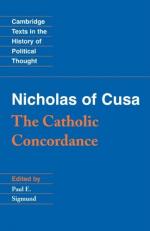|
This section contains 7,612 words (approx. 26 pages at 300 words per page) |

|
SOURCE: Dupré, Louis. “Nature and Grace in Nicholas of Cusa's Mystical Philosophy.” American Catholic Philosophical Quarterly 64, no. 1 (Winter 1990): 153-70.
In the following essay, Dupré outlines Cusanus's efforts to bridge the gap between immanence and transcendence, a divide driven by the rise of nominalist thought in the late Medieval era. Observing Cusanus's debt to Meister Eckhart and Neoplatonism, Dupré finds that Cusanus's understanding of nominalist theology anticipated its modern consequences: the absolute separation of the natural and the supernatural.
Hans Blumenberg in his influential The Legitimacy of the Modern Age insists that modern culture is not to be interpreted as merely transforming the theological concepts of an earlier age, as the so-called secularization thesis posits, but rather as introducing a radically new mode of self-assertion which reoccupies the available religious concepts while endowing them with a wholly different meaning. This thesis of radical novelty needs to be seriously qualified...
|
This section contains 7,612 words (approx. 26 pages at 300 words per page) |

|


